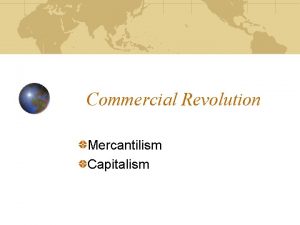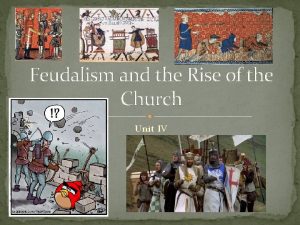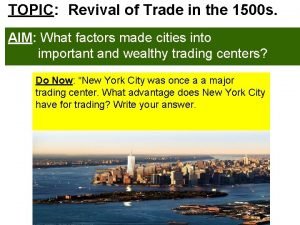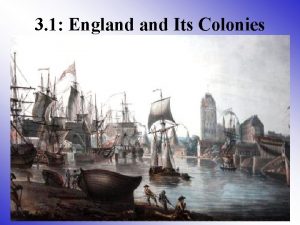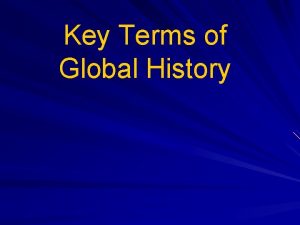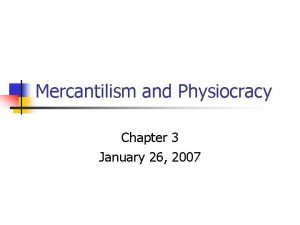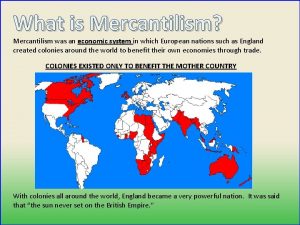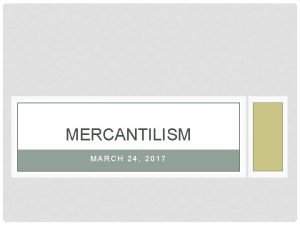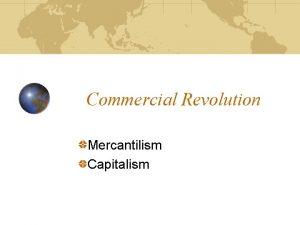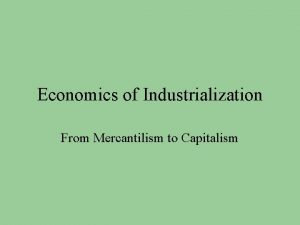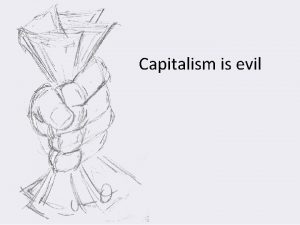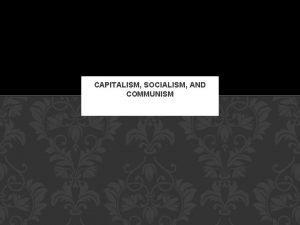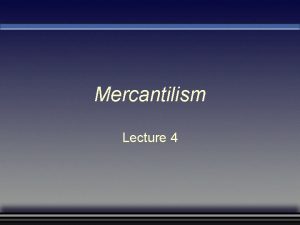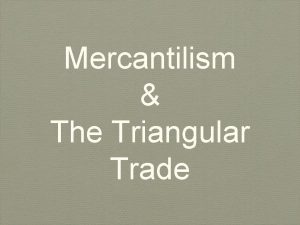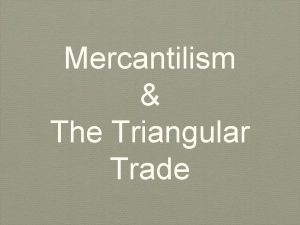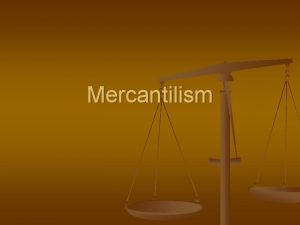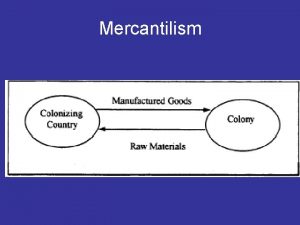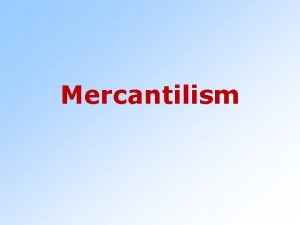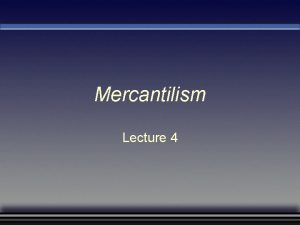Commercial Revolution Mercantilism Capitalism What is the Commercial
















- Slides: 16

Commercial Revolution Mercantilism Capitalism

What is the Commercial Revolution? Period of European economic expansion, colonialism, and mercantilism from 16 th-18 th century European nations competed for overseas markets, colonies and resources. New economic systems emerged: Mercantilism Capitalism New money and banking systems were created.

Mercantilism An economic practice adopted by European colonial powers in an effort to become self-sufficient Colonial economies were limited by the economic needs of the mother country.

Role of the colonies Colonies existed for the benefit of the parent country Colonies provided resources and raw materials not available in Europe Colonies enriched the parent country by serving as a market for its manufactured goods To achieve these ideals, European powers passed strict laws regulating trade with their colonies Colonies could not set up their own industries to manufacture goods (particular restrictions placed on woolen garment industries, hats, and iron production [by British], some domestic sale allowed but no exports from colonies) – Enumerated goods – items that can only be sold to the parent country. Examples include tobacco, sugar, and cotton. – Colonies could also not buy goods from foreign countries – In addition, only ships from the parent (“mother”) country and the colonies could be used to trade goods back and forth

Increasing national wealth A single national currency was created along with standard weights and measures Governments created monopolies in certain industries Protectionist policies Tariffs – – In this case, taxes on imported goods Protected local industries from foreign competition by increasing the price of foreign goods. Business increased for domestic goods which were cheaper.

Capitalism An economic system based on private ownership and the investment of wealth for profit. Individuals and corporations invest money using their capital, not labor, to make more money. Prices are set by supply and demand in the marketplace, not by the government. Before, only churches and government had an opportunity to invest and become wealthier. Now individuals could become wealthy by investing and selling products Merchants grew wealthier

Bullion (Gold & Silver) A nation’s real wealth is measured in gold and silver bullion There is a fixed amount of wealth in the world In order to build up a supply of bullion, a nation must export more goods than it imported Bullionism--the belief that the economic health of a nation could be measured by the amount of precious metal, gold, or silver, which it possessed. Each nation tried to achieve economic self-sufficiency.

Exporting Precious Metals Mining precious metals was a huge achievement for man Majority of gold came from Africa Majority of silver came from present-day Bolivia and Mexico. Japan also mined silver. Metals were exported to Europe and Asia.

Spain was one of the first nations to discover silver mines in South and Central America Had a large amount of silver and gold imported each year from the Americas In the 1600 s Spain experienced a steady growth in the population. Because of the increase in the population, and focusing on mining, Spain did not have enough food for everyone, causing inflation.

Treasures from the Americas!

Favorable Balance of Trade Regulated commerce could produce a favorable balance of trade. In general, tariffs should be high on imported manufactured goods and low on imported raw material.

Global Trade Mercantilism is one factor which pushed European countries to expand their territories and influence around the world. Exploration – added to wealth of the middle class in countries with Atlantic ports. The economic power of the Italian city-states declined as Western European countries found new trading routes. Main European explorers/powers Spain Portugal France England The Netherlands

Asia was invaded by competing Europeans searching for wealth In a short time, the 3 leading nations in Asia were England, the Dutch (Netherlands) and Portugal. Each of these countries had their own East Indian Company which were in charge of handling the affairs that took place overseas Each company had the ability to mint money, make treaties and raise their own armies. The Dutch East India Company was richer and more powerful than England’s and Portugal's companies As a result, the Dutch drove out the British and Portuguese and established dominance over the Far East region. Dominance meant money, power, and prestige.

Who Gained the Most? Government was NOT the only source of power…however government is getting richer because of colonial expansion. Lead to inflation Merchants – merchants who invested in overseas ventures gained wealth. Business people formed the new middle class and their power increased. • Nobles – nobles whose wealth rested in land ownership did not benefit from the development of mercantilism and the price revolution. • Colonists – In general, colonists are usually described as losing out as a result of mercantilism. Restrictions on trade and production meant they could not earn money at their full potential. Still, colonists did benefit in some ways from mercantilism. For example, colonists gained a built-in market for their raw products/materials.

Commercial Revolution will lead to… Competition between nations Need for larger labor force Conflict on the seas

Impact of Commercial Revolution Lead to absolute monarchy of the seventeenth century Balance between monarchy and nobles shifted in favor of the monarchy loss of feudal independence monarchs gained new powers decline of parliamentary government use of mercantilism as state-controlled economic system.
 Mercantilism and commercial revolution
Mercantilism and commercial revolution Mercantilism vs capitalism
Mercantilism vs capitalism Mercantilism vs capitalism
Mercantilism vs capitalism Commercial and non commercial food service
Commercial and non commercial food service Commercial revolution
Commercial revolution The commercial revolution
The commercial revolution Commercial revolution
Commercial revolution Russian revolution vs french revolution
Russian revolution vs french revolution You should hope that this game will be over soon
You should hope that this game will be over soon Third agricultural revolution definition
Third agricultural revolution definition Mercantilism cartoon
Mercantilism cartoon Nomad world history definition
Nomad world history definition Mercantilism
Mercantilism Difference between mercantilism and physiocracy
Difference between mercantilism and physiocracy How did mercantilism work
How did mercantilism work Mercantilism graphic organizer
Mercantilism graphic organizer Mercantilism in the colonies
Mercantilism in the colonies
